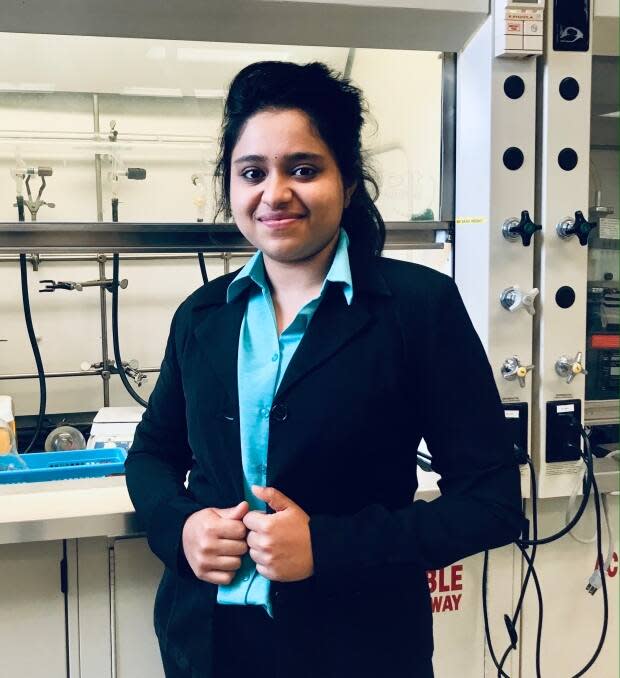Mount Allison students create new building material from orange peels

A group of student researchers at Mount Allison University have found an environmentally friendly alternative to conventional building materials: orange peels.
Enviroot is a project run through Enactus, a global community of student researchers and entrepreneurs that was founded by students at the university a few years ago to find sustainable options for commonly needed products.
Ceiling tiles and building materials such as fibreboard often consist of formaldehyde, a colourless, flammable gas.
"Formaldehyde leaks into the environment and causes a lot of trouble for asthmatic people and over time it can cause other medical conditions," Padmapriya Srinivasan, a fourth-year honours student in chemistry who has volunteered with Enviroot for the last few years, told the CBC's Shift.
Srinivasan said the society decided to find an environmentally friendly alternative to the harmful gas and at first thought a component in potato peels could work.
The society partnered with McCain Foods, which agreed to supply the students with its leftover potato peels for research.
Srinivasan said that after several tries, the society realized potato peels don't have enough fibre.
"We were like, 'OK, we need something new, we need something quick, we need something efficient to make this project work'," she said.
The students realized they drink a lot of orange juice every day, with orange peels going to waste.
I joined Enactus because I wanted to be surrounded by other students who are equally passionate and caring about the environment as I am. - Padmapriya Srinivasan
Orange peels have much more fibre than potato peels, said Srinivasan.
After research trials and a lot of speed bumps using orange peels discarded from Mount Allison University's dining hall, she said the society was able to create a prototype that resembles a bulletin board.
Srinivasan says the orange-peel particle board can be used to tack pins or sticky notes without falling apart.
Now the group is gaining recognition on a national scale. Srinivasan was most recently named Project Manager of the Year for her work with Enviroot.
"I joined Enactus because I wanted to be surrounded by other students who are equally passionate and caring about the environment as I am," she said.
She said becoming the group's manager was outside her areas of expertise, but it's an important role.
"I needed to gain the business perspective to actually make this project a success, because ultimately if we want to bring this to the world, we need to consider the economic, the financial and scientific side."
She said the award allowed the project to move forward because it brought awareness to students who wanted to help.
The next step is getting a patent for the prototype and finding companies willing to divert their orange peels from landfills to the project, said Srinivasan.
She said the team also needs to expand its production scale across Canada to fulfil the ultimate goal of becoming a self-sustaining company.
Srinivasan said she will act as the project manager again in the next academic year and hopes the project will become an operating business by the end of her time at Mount Allison so she can pass it on to another student.

 Yahoo Finance
Yahoo Finance 